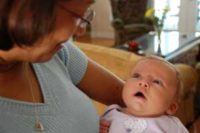26 Jul Menopause Facilitates Transmission of Cognitive Resources To Grandchildren
MedicalResearch.com Interview with:
Carla Aimé PhD
Institute of Evolutionary Sciences of Montpellier
France
MedicalResearch.com: What is the background for this study? What are the main findings?
Response: In all human populations, regardless of environmental and socioeconomic conditions, menopause occurs in women well before the end of their expected lifespan. Conversely, extensive post-reproductive life-span is rare in other species; except in some cetaceans. Evolutionary theory predicts that menopause and extensive post-reproductive lifespan should emerge and persist in populations only if it is advantageous for gene transmission. Identifying this advantage is a long-standing issue, and some hypotheses has already been suggested by other researchers. However, testing these hypotheses about the emergence of menopause is difficult, in particular because menopause exists today in all human populations. It is thus not possible to measure in real life the evolutionary advantage related to menopause by comparing gene transmission of women who stop reproduction and women who don’t stop reproduction. Here, we used computer simulations to overcome this difficulty by modeling the emergence of menopause in simulated human populations.
The main finding were the following :
– Physiological constraints are not required for menopause to emerge.
– The increasing cost of reproduction with age cannot explain menopause.
– Grandmothering is part of the process leading to menopause : stopping reproduction allow reallocating resources to existing children and grand-children, thus leading to increase gene transmission via increased fertility of children and survival of grand children
– Cognitive resources are also important. Indeed, cognitive abilities allow accumulation of skills and experience over the lifespan, thus providing an advantage for resource acquisition. These surplus resources can then be used to increase the number of offspring or be transmitted to existing offspring and grandoffspring. Stopping reproduction during aging allows allocating more resources to assist offspring and grandoffspring, thus increasing children’s fertility and grandchildren’s survival.
MedicalResearch.com: What should clinicians and patients take away from your report?
Response: First, menopause is not only the consequence of physiological constraints. It has been selected by natural selection as it increases gene transmission.
Second, it increases gene transmission by the mechanisms that I have described above. Grandmothering and cognitive resources are thus required for menopause to emerge.
MedicalResearch.com: What recommendations do you have for future research as a result of this study?
Response: From a methodological point of view, this study also demonstrate that artificial neural networks are a powerful tool to model allocation decisions. This tool thus may be used in the future to address many questions in evolutionary biology. Indeed, allocation decision trade-offs are central in many long-standing debates about reproduction, senescence, etc.
MedicalResearch.com: Is there anything else you would like to add?
Response: There are many studies suggesting physiological explanations for menopause. It is always important to remind that proximal explanations and ultimate explanations are often not mutually exclusive. We found that physiological constraints are not a requirement for menopause to emerge. However, because menopause is advantageous for gene transmission, natural selection may have favored some physiological mecanims which are responsible for menopause at the proximal level. I thus just want to say that our evolutionary explanation for menopause do not implies that studies describing physiological mechanisms leading to menopause are necessarily wrong.
MedicalResearch.com: Thank you for your contribution to the MedicalResearch.com community.
Citation: Carla Aimé, Jean-Baptiste André, Michel Raymond. Grandmothering and cognitive resources are required for the emergence of menopause and extensive post-reproductive lifespan. PLOS Computational Biology, 2017; 13 (7): e1005631 DOI: 10.1371/journal.pcbi.1005631
Note: Content is Not intended as medical advice. Please consult your health care provider regarding your specific medical condition and questions.
Last Updated on July 26, 2017 by Marie Benz MD FAAD

